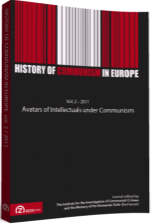The Enthusiasm of Intellectuals for Communism at the End of First World War in France
The Enthusiasm of Intellectuals for Communism at the End of First World War in France
Author(s): Andreea ZamfiraSubject(s): History
Published by: Zeta Books
Keywords: First World War; France; communism; intellectuals
Summary/Abstract: This paper is both a description and an analysis of some of the most interesting cases of French intellectuals seduced by the communist project at the end of the First World War. While the major objective of this paper was to present the manner in which the communist ideology and the regimes inspired by this one afterwards were imagined and conceived by widely known intellectuals at that time, its secondary objective was to bring into debate a salient and, at the same time, somehow neglected issue in the academic literature – the intellectual attachment to the totalitarian ideas in Western Europe. The First World War made it possible that the utopian philosophies meet the political will of recreating a new social order and, also, it gave birth to a mass intellectual movement that, for the first time in the European history, has burst in the East side of the continent and influenced famous western intellectuals’ outlooks on culture, society and politics. Among the French intellectuals fascinated by Communism at the end of the First World War, we distinguished several types, any of them finding its sap in different sources of attraction. The first profile belongs to the «nostalgic intellectual », who has a particular admiration for the great events from the historical past, especially for the French Revolution of 1789. Alphonse Aulard is one French intellectual we considered as being attached to Communism due to its nostalgia. The «idealists», most of them Slavophile, form the second group of intellectuals. Pierre Pascal, as well as the other French Slavophiles, developed a sincere admiration, sometimes even naïve, for the old Russian society, perceived as the cradle of the orthodox religion and of the traditional community life. Thirdly, it is the «nonconformist» intellectual’s portrait that draws our attention. Both nonconformist and idealist intellectuals are conservative, rejecting certain modern phenomena. Nevertheless, unlike the idealist, the nonconformist intellectual does not oppose modernity per se; he only wants to recreate it as peaceful and tolerant. An outstanding nonconformist intellectual to be mentioned here is Romain Rolland. Finally, the fourth profile identified in this paper is the «modernist» or the «surrealist» Michel Winock wrote about. André Breton is one of the most renowned surrealist intellectuals who were fascinated by Communism in France. The surrealist intellectuals defended the idea of a new régime de l’esprit, proposing new aesthetic categories (the dream, the unconscious, the illogicality) and, thereby, getting closer to an aesthetic definition of the revolution and of a modern political project.
Journal: History of Communism in Europe
- Issue Year: 2011
- Issue No: 2
- Page Range: 11-28
- Page Count: 18
- Language: English
- Content File-PDF

